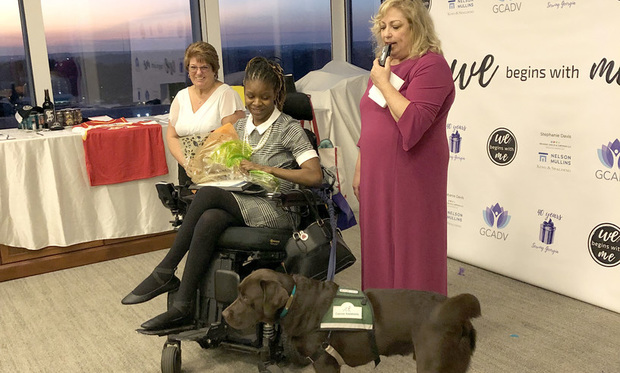Lawyers and Advocates Celebrate 40 Years of Work to End Domestic Violence
The event was a 40th birthday party for the Georgia Coalition Against Domestic Violence and a fundraiser for the collaborative of nonprofit organizations around the state. "More needs to be done," said one of the evening's honorees, former Fulton County ADA April Ross.
October 11, 2019 at 06:53 PM
7 minute read
 April Ross receives flowers from the Georgia Coalition Against Domestic Violence after her service dog, Hershey, checks them out for her as Teresa Millsaps (left) and Jan Christiansen watch. (Photo: Katheryn Tucker/ ALM)
April Ross receives flowers from the Georgia Coalition Against Domestic Violence after her service dog, Hershey, checks them out for her as Teresa Millsaps (left) and Jan Christiansen watch. (Photo: Katheryn Tucker/ ALM)
Lawyers and advocates gathered on the Nelson Mullins Riley & Scarborough rooftop overlooking Atlanta Thursday evening to celebrate four decades of work to end domestic violence.
The event was a 40th birthday party for the Georgia Coalition Against Domestic Violence, complete with canapes and cake, gifts and balloons. And it was a fundraiser for the collaborative of nonprofit organizations around the state, with guests buying tickets and law firms and GCs chipping in sponsorships.
Sponsors included host firm Nelson Mullins, IP boutique Muenier Carlin & Curfman, King & Spalding, Alston & Bird, Weinberg Wheeler Hudgins Gunn & Dial and the Georgia Association of Black Women Attorneys.
Several in-house counsel were also co-hosts of the event:
• Noah Peeters, general counsel, Jamestown • Jennifer Blakely, manager, litigation, Chick-fil-A • Peter Duitsman, vice president and associate general counsel, Turner Broadcasting System • Jennifer Donatuti, VP and assistant GC, Fiserv • Ling-Ling Nie, GC and VP for ethics and compliance, Georgia Tech • Nora Robb, senior corporate counsel-data strategy and technology at Cox Automotive
As the sun went down and the lights came up, the group used the occasion to honor some of its heroes.
One is Vicky Kimbrell, director of the Family Violence Project for Georgia Legal Services. She received the group's "impact award," created with her in mind, GCADV executive director Jan Christiansen said.
Kimbrell has been working to help survivors of domestic violence find safety, peace and justice for 39 of the past 40 years. She said that, when she started her work with the statewide legal aid network, police officers considered domestic violence to be a private matter between a couple.
"They'd tell him to go take a walk around the block," she said—noting that statistics show that 90% of the time the abuser is a man.
In the early days, if the woman didn't want to press charges, that was the end of it, she said. Now, prosecutors sometimes proceed anyway, working under the premise that violence is still a crime, even when the victim can't find her voice.
If the woman did press charges, the man would be allowed to go home before his victim finished signing the paperwork at the police station. "He'd beat her home—literally," Kimbrell said.
Domestic violence protective orders were unheard of in the early days. Kimbrell and her colleagues essentially invented them, drawing up a form for others to use. Now, the 90 lawyers with Georgia Legal Services routinely file protective orders, though they don't have the resources to help with more long-term solutions like divorce.
"We're still making progress," Kimbrell said. "But we don't have enough lawyers to do everything."
The greatest need now, she said, is for attorneys to donate their time to help protect survivors—one case at a time.
She recognized that it's hard work—and not just because of the demands of a busy private practice. "It's so difficult to absorb the trauma," she said. Even for the lawyers.
The coalition members try to help with that by providing support and encouragement inside and out of their ranks. "That's how we are able to keep doing this work," said Jennifer Thomas, the former executive director of the Georgia Commission on Family Violence, a state agency that partners with the coalition. Thomas left in June to join the Criminal Justice Coordinating Council, where she is now director of strategic partnership for the victim assistance division.
The commission and the coalition have worked together on many projects, notably an annual domestic violence fatality review. The two groups show "how a nonprofit and a state agency can work hand in hand for the same thing," Christiansen said as she presented Thomas with a trophy and flowers. "We all want justice and safety," she said, looking at Thomas. "This lady here is everything."
With eyes on her 4-year-old daughter, Thomas said, "I do this work in the hope that she will grow up never having to know domestic violence existed."
The groups have decided to end the fatality review and focus in the future on ways to intervene early and avert tragedy.
"More needs to be done," said the commission's new executive director, April Ross, a former Fulton County assistant district attorney who succeeded Thomas this month. Ross said she hopes to build on the work of Thomas. "I have big shoes to fill," Ross said.
Ross was shot and paralyzed by her husband in 2014, on the day she filed for divorce—grim evidence that the most dangerous time for victims is when they try to leave their abusers. It was meant to be a murder-suicide, but Ross survived. After extensive rehabilitation, she returned to work in 2015 at the DA's office, where she joined the Domestic Violence Policy and Trial Unit. She also began to mentor individuals with recent spinal cord injuries at the Shepherd Center, particularly those whose injuries were the result of gun violence. And she became a champion for survivors of intimate partner violence, serving on the commission's board.
In the announcement of her new job, her last boss, Fulton County District Attorney Paul Howard, said "April Ross is by a wide margin the greatest person I have ever known." "She has overcome obstacles most people could not even imagine. Despite these tremendous challenges, she stands before us all beaming, shining, gleaming—ready to conquer the world," Howard said at the time. "I have been the beneficiary of her presence these many years, and I am delighted she now has the opportunity to spread her brand of professional magic throughout the state."
The tall DA dropped by the rooftop Thursday evening to show his respect for Ross. On his way out, Howard stopped to chat and again marveled at her strength, positive energy, perseverance and something else: her humor.
He said he was traveling for a law enforcement conference the day she was shot. An out-of-town police chief told him one of his ADAs had been killed. Then he learned she was still alive. He flew home and rushed to the hospital. A doctor met him at the door and told him she likely wouldn't make it through the night. He went in. She couldn't speak. But she had a tablet in her hand.
He said he told her, "If there is anything I can do for you, please let me know."
She started writing down letters.
"R.A.I.S.E."
Ross smiled later when she heard Howard told that story. "I'd been meaning to ask him for a raise," she said. "I didn't know I was seriously injured. I thought I'd be back at work in a couple of weeks."
It took a lot longer, but she made it.
Ross was presented with a trophy and a bouquet by Christiansen and coalition board president Teresa Millsaps, executive director of Tranquility House, a domestic violence protection program in Cartersville. Christiansen called Ross "a force to be reckoned with."
The flowers were inspected first by a protective chocolate-colored service dog named Hershey.
"We can do great things," Ross said, "but only together."
This content has been archived. It is available through our partners, LexisNexis® and Bloomberg Law.
To view this content, please continue to their sites.
Not a Lexis Subscriber?
Subscribe Now
Not a Bloomberg Law Subscriber?
Subscribe Now
NOT FOR REPRINT
© 2025 ALM Global, LLC, All Rights Reserved. Request academic re-use from www.copyright.com. All other uses, submit a request to [email protected]. For more information visit Asset & Logo Licensing.
You Might Like
View All


Trump RTO Mandates Won’t Disrupt Big Law Policies—But Client Expectations Might
6 minute read
Trump's RTO Mandate May Have Some Gov't Lawyers Polishing Their Resumes
5 minute readTrending Stories
- 1No Two Wildfires Alike: Lawyers Take Different Legal Strategies in California
- 2Poop-Themed Dog Toy OK as Parody, but Still Tarnished Jack Daniel’s Brand, Court Says
- 3Meet the New President of NY's Association of Trial Court Jurists
- 4Lawyers' Phones Are Ringing: What Should Employers Do If ICE Raids Their Business?
- 5Freshfields Hires Ex-SEC Corporate Finance Director in Silicon Valley
Who Got The Work
J. Brugh Lower of Gibbons has entered an appearance for industrial equipment supplier Devco Corporation in a pending trademark infringement lawsuit. The suit, accusing the defendant of selling knock-off Graco products, was filed Dec. 18 in New Jersey District Court by Rivkin Radler on behalf of Graco Inc. and Graco Minnesota. The case, assigned to U.S. District Judge Zahid N. Quraishi, is 3:24-cv-11294, Graco Inc. et al v. Devco Corporation.
Who Got The Work
Rebecca Maller-Stein and Kent A. Yalowitz of Arnold & Porter Kaye Scholer have entered their appearances for Hanaco Venture Capital and its executives, Lior Prosor and David Frankel, in a pending securities lawsuit. The action, filed on Dec. 24 in New York Southern District Court by Zell, Aron & Co. on behalf of Goldeneye Advisors, accuses the defendants of negligently and fraudulently managing the plaintiff's $1 million investment. The case, assigned to U.S. District Judge Vernon S. Broderick, is 1:24-cv-09918, Goldeneye Advisors, LLC v. Hanaco Venture Capital, Ltd. et al.
Who Got The Work
Attorneys from A&O Shearman has stepped in as defense counsel for Toronto-Dominion Bank and other defendants in a pending securities class action. The suit, filed Dec. 11 in New York Southern District Court by Bleichmar Fonti & Auld, accuses the defendants of concealing the bank's 'pervasive' deficiencies in regards to its compliance with the Bank Secrecy Act and the quality of its anti-money laundering controls. The case, assigned to U.S. District Judge Arun Subramanian, is 1:24-cv-09445, Gonzalez v. The Toronto-Dominion Bank et al.
Who Got The Work
Crown Castle International, a Pennsylvania company providing shared communications infrastructure, has turned to Luke D. Wolf of Gordon Rees Scully Mansukhani to fend off a pending breach-of-contract lawsuit. The court action, filed Nov. 25 in Michigan Eastern District Court by Hooper Hathaway PC on behalf of The Town Residences LLC, accuses Crown Castle of failing to transfer approximately $30,000 in utility payments from T-Mobile in breach of a roof-top lease and assignment agreement. The case, assigned to U.S. District Judge Susan K. Declercq, is 2:24-cv-13131, The Town Residences LLC v. T-Mobile US, Inc. et al.
Who Got The Work
Wilfred P. Coronato and Daniel M. Schwartz of McCarter & English have stepped in as defense counsel to Electrolux Home Products Inc. in a pending product liability lawsuit. The court action, filed Nov. 26 in New York Eastern District Court by Poulos Lopiccolo PC and Nagel Rice LLP on behalf of David Stern, alleges that the defendant's refrigerators’ drawers and shelving repeatedly break and fall apart within months after purchase. The case, assigned to U.S. District Judge Joan M. Azrack, is 2:24-cv-08204, Stern v. Electrolux Home Products, Inc.
Featured Firms
Law Offices of Gary Martin Hays & Associates, P.C.
(470) 294-1674
Law Offices of Mark E. Salomone
(857) 444-6468
Smith & Hassler
(713) 739-1250






